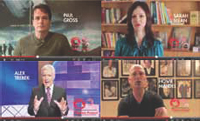 In September 2009, first-year Windsor Law students Byron Pascoe and Michael O’Brien were chatting about what they listen to when they jog. They joked that now that they were law students, they should ditch the tunes and run to Pierre Trudeau reading the Canadian Charter of Rights and Freedoms.
In September 2009, first-year Windsor Law students Byron Pascoe and Michael O’Brien were chatting about what they listen to when they jog. They joked that now that they were law students, they should ditch the tunes and run to Pierre Trudeau reading the Canadian Charter of Rights and Freedoms.
The wisecrack led to a discussion about public awareness of the Charter, and then the realization they’d be graduating in 2012, its 30th anniversary. In short order, they met with law school dean Bruce Elman, created a charity, nabbed $15,000 in funding from the Law Foundation of Ontario and launched the Charter Project.
“Our target includes anybody who wants to become more engaged with the political process and become more aware of their rights and responsibilities as Canadians,” says Pascoe.
The group, which grew to 40 law student volunteers, recruited Canadian celebrities for public service announcements. Twenty-three stars, including Paul Gross, Howie Mandel, Sarah Slean and Alex Trebek, participated in montage-style messages with phrases like, “The Charter crosses borders and unites us as Canadians.” The spots ran on more than 1,000 Cineplex Entertainment screens for four weeks this past spring and got airtime on Showcase, HGTV Canada, CPAC and other TV channels.
The project’s website (charterproject.ca) features the PSAs, videos of the likes of Toronto litigator Douglas Elliott and former Supreme Court justice Ian Binnie talking in depth about the Charter, and online workshops high school teachers can download and run in law or social studies classes.
“It is very important to have a periodic review of the Charter,” says Frank Iacobucci, former Supreme Court justice, adding that the project has led to “more understanding and intelligent commentary.”
Pascoe and O’Brien are now ready to pass the torch as they begin articling this summer, but will remain active in an advisory capacity. Says O’Brien, “The team is proud of the campaign and the results thus far, and of the fact that such a large group of us were able to work together for nearly three years to get here.”
The next crop of student volunteers will continue to build the project by working closely with the law school to make it sustainable over the long term. Plans include producing more workshops, possibly in conjunction with Windsor’s education faculty, and creating a summer social justice fellowship based in Canada.

